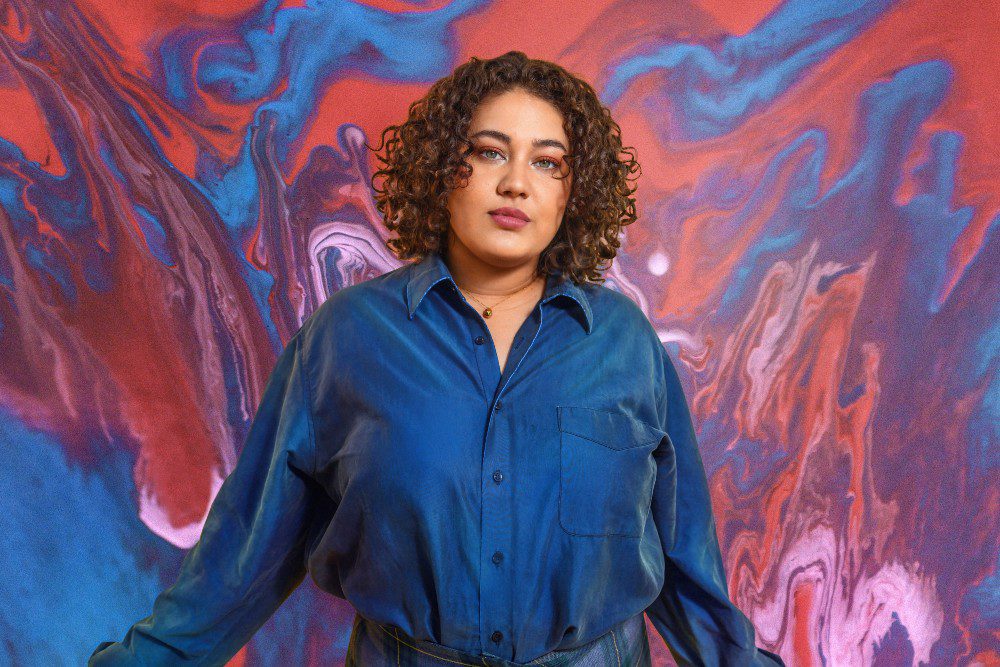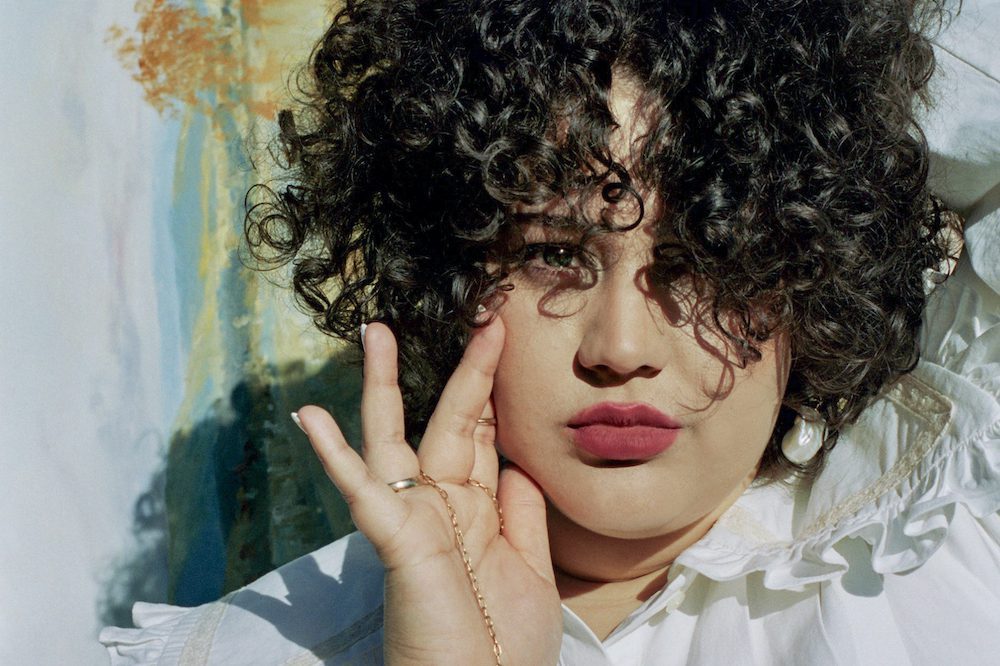

Georgia Odette Sallybanks – better known simply as Odette – set a high benchmark with her debut album To a Stranger, which peaked at number 13 on the ARIA (Australian Recording Industry Awards) Albums Chart and was nominated for a Best Adult Contemporary Album ARIA in 2018. But her sophomore album Herald, out February 5, doesn’t disappoint; the layered, atmospheric instrumentals, dance-friendly beats and bright, resonant vocals is a formidable combination. “I Miss You I’m Sorry” adopts quirky stop-start rhythms, flourishes of strings, and ultimately feels like a glorious auditory collage of cut ‘n’ paste euphonics. The title track lands a throbbing beat over rattlesnake percussion, harp and handclaps building to a stadium-sized banger. At just 11 tracks, it’s not outstaying its welcome, and every minute is killer, no filler.
Born in Bath, England, Odette moved to Sydney soon after and began songwriting aged eight. Her music is almost diary-like, revealing and articulate by equal measure, and incorporating ballad, spoken word, instrumentals and pop melodies within each song. Back in 2018, Odette admitted to The Sydney Morning Herald that “you can’t just sing a song and all your problems go away.” With its seemingly cathartic nature, Herald plays almost like Odette’s attempt to challenge that sentiment.
The most talented artists can weave their pain and traumatic experiences into their creations, but that doesn’t relieve them of the emotional resonance or the memories and how they’ve become ingrained under the skin. In her early 20s, Odette is still so young that the intensity of adolescence is still a snakeskin she’s barely shuffled out of. The combined impact of troubled relationships, the pressures of a professional creative career, and trying to manage a diagnosed mental health disorder under the stormclouds of pandemic conditions might be too great for some young women to handle. Odette has more than handled them, though. She’s created an album that speaks of hope, resilience and evolution.
To A Stranger was released by record label EMI, which signed Odette at 17. She was 20 when the album came out, featuring collaborations with songwriters Charlie Hugall (Florence + The Machine, Ed Sheeran), Jason Cox (Blur) and Sarah Aarons (Zedd). “Those songs were written over the course of a few years, when I was aged 14 to 18,” recalls Odette. “It was a time capsule of my adolescence. It was me just figuring out what I was experiencing. With the new album, I’m coming to a new awareness.”
Herald sees Odette “taking accountability” for her actions during a recent mental illness which was only diagnosed last year; this period of sickness informs the album. “I had to work out what was me, what’s not me, and I had to work out how to regulate my emotions. There are lines in the album where you can hear that it wasn’t written by a well person,” she tells Audiofemme.
Though Odette is reluctant to speak too much to her own diagnosis and personal experience beyond what she shares in her music, she does impart her opinion around admitting to pain, owning it, and taking the measures to be well. “There’s no choice to be troubled – it’s okay to be pained or mentally ill. It’s not okay to shirk your responsibility to get well,” she says. “Honestly, if you leave it up to fate, I don’t believe in fate. If you believe ‘the universe has got me,’ you can hurt people a lot. We are human beings, all having the same experience, but when your problems hurt you and other people, you have to do something about it. There are people that care and safety nets.”
“Feverbreak,” Odette’s collaboration with Hermitude, appears on Herald and offers a startling glimpse into her state of mind as she reaches out for help. “She’s a body, not herself, not a lover but a service…just a scream amidst the reeds tangled around and around her legs…” she sings. “Can you help me break the fever? Never needed anything more than your real love.” Hermitude, the Australian electro-meets-hip hop duo, have been well established in the local music scene for 20 years, receiving countless ARIA Award nominations and touring widely through the US, UK and Europe, but they encouraged Odette to express herself on the collab. “They said to take the reigns, figure out the structure of the track, and it was a really cool experience, actually,” she remembers.
Hip hop wasn’t a major influence on Odette’s sound though, so the collaboration was a step into a new environment. Rather, Odette’s earliest inspiration for songwriting was 2004 album Sound of White, by Australian artist Missy Higgins. The pared-back, emotionally raw and beautiful work launched Higgins onto the world stage. Both Higgins and Odette are skilled storytellers, unafraid and willing to traverse difficult memories and emotions to find where their scars have begun to heal and what they’ve learnt, gained and developed as a result of grief. Their songs are not miserable in the slightest, but hopeful, nuanced and mature. More recently, Fiona Apple has been Odette’s major inspiration, along with Tori Amos, Joanna Newsome, Björk, Kate Bush, Macy Gray and Conor Oberst, best known for his work in Bright Eyes.
Odette’s own sound has echoes of her influences in its melodic catchiness, the skilled balladry and insightful lyrics. These qualities are all amplified on the single “Amends,” which is about choosing kindness. The song speaks to perseverance in the struggle with mental health and how it affects relationships. Produced and mixed by Damian Taylor, it is enriched with musical arrangements by Kelly Pratt, who has also worked with well-established international artists Beirut, David Byrne and Arcade Fire.
Odette nominates “Mandible” as her favourite track, though. “It’s closer to my headspace now, it’s more relatable to me now,” she says. “There’s hope in the track, it’s not fueled by rage. It’s a yearning for connection, stability and love.”
These are common desires, especially as the uncertainty of pandemic life has meant border closures, the end of live performances and the huge pressure on artists to make a living or seek government support. There’s the added pressure, for Odette, of preparing the people around her to see reflections of their relationships to her in her songs. “I talk to people before I release songs about them,” she says. “They know that it’s not necessarily about them, it’s about me processing my own emotions rather than being about them.”
For those who don’t know Odette personally, their first impression may come from the beautiful, disturbing aesthetic of Herald’s album cover, designed by Melbourne-based artist Eben Ejdne. “I wanted to make sure he captured that sense of morphing into something new. He knew exactly what to do. It was our first time working together,” Odette says. “Everything to do with this project…I really cared about detail. I worked on editing and treatments, I made puppets for the ‘Amends’ video.”
There are tentative plans to tour with Herald; though it’s too soon to lock anything in until borders reopen, Odette played New York, LA, and SXSW back in the good old days of international travel. “Texas was great, it was so good. I played at a few different places, but the best was an indoor show where it was very dark and there was a solid 200, 300 people having a great time,” she recalls. “I would love to go back… I’ve got a keyboardist, a drummer, and ultimately it would be us playing mostly from Herald and a few [songs] from the first record.”
Until touring can commence and life resumes some normalcy, Odette has been applying her creative skills to gardening and working with clay. She jokes, “I’m fickle with my hobbies!”
Follow Odette on Facebook and Instagram for ongoing updates.


